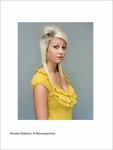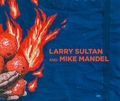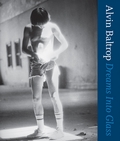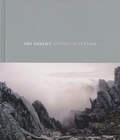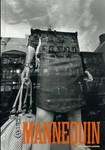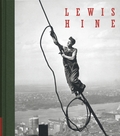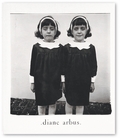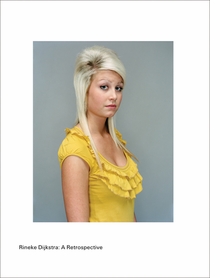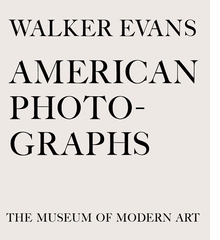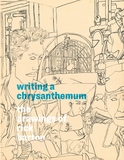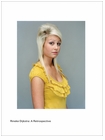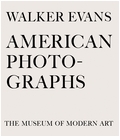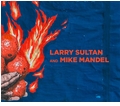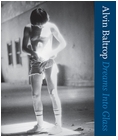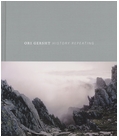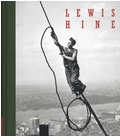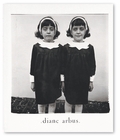ARTBOOK BLOGEventsStore NewsMuseum Stores of the MonthNew Title ReleasesStaff PicksImage GalleryBooks in the MediaExcerpts & EssaysArtbook InterviewsEx LibrisAt First SightThe Artbook 2024 Gift GuidesArtbook Featured Image ArchiveArtbook D.A.P. Events ArchiveDATE 1/14/2025 Join us at the Atlanta Gift & Home Winter Market 2025DATE 1/2/2025 Wishing You the Beauty of the MysteriousDATE 12/31/2024 Happy New Year from Artbook | D.A.P.DATE 12/26/2024 An ode to holiday pleasuresDATE 12/24/2024 Happy Holidays from Artbook | D.A.P.DATE 12/18/2024 BMCM+AC presents David Silver on 'The Farm at Black Mountain College'DATE 12/17/2024 Good news for open mindsDATE 12/14/2024 A fascinating new study of Helen Frankenthaler & Co.DATE 12/12/2024 Donlon Books presents the London launch of 'More Than the Eyes: Art, Food and the Senses'DATE 12/12/2024 A fresh new take on Black Mountain CollegeDATE 12/8/2024 The Primary Essentials presents a book signing with JJ ManfordDATE 12/8/2024 ‘Larry Sultan & Mike Mandel: Evidence’ is back in print at last!DATE 12/7/2024 Artbook at Hauser & Wirth Los Angeles Bookstore presents Chloe Sherman on 'Renegades San Francisco: The 1990s' | STAFF PICKS | FROM THE SHELVES
| ||||||||||||||||||||||||
in stock $45.00 Free Shipping UPS GROUND IN THE CONTINENTAL U.S. |
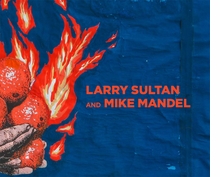 Larry Sultan & Mike Mandel
Larry Sultan & Mike Mandel
Published by D.A.P./Distributed Art Publishers.
Text by Charlotte Cotton, Connie Lewallen, Thomas Wagner, Carter Ratcliff, Jonathan Lethem.
The artistic collaboration between Larry Sultan (1946-2009) and Mike Mandel (born 1950) began in 1972, when they were both graduate students at the San Francisco Art Institute. Over the next 30 years, they created 20 photographic projects: two publications (including the landmark book Evidence); two exhibitions; the film, JPL; three public commissions; and 12 billboard series displayed on sites throughout California and the continental U.S. This collaboration enabled Sultan and Mandel to evolve a seemingly authorless style; most of their works adapted found imagery from archives or from popular media, neutralizing the intended commercial or documentary content by uncovering and emphasizing the inherent banality.
This substantial overview surveys Sultan and Mandel's 30 years of collaboration beginning with early billboard projects investigating themes of Californian culture and wealth, such as "Oranges on Fire" and "Cornucopia", based on a 1955 hand-tinted postcard of a model posing amid ripe oranges, and bearing the tagline: "California Gold Fills the Horn of Plenty To Overflowing." Their billboard projects continue with the tongue in cheek Ties and Whose News? in which the secondary title, "Whose News Abuses You?" is slyly imbedded in the image; and the duo's final billboard collaboration, Trouble Spots, a billboard project that used conflated and opposing ideologies in both fictitious and real locations.
Larry Sultan and Mike Mandel continues this extensive overview by chronicling their work with sourced images in the exhibitions Replaced (1975); Newsroom (1983); and the publications How to Read Music in One Evening (1974) and Evidence (1977). Five critical essays provide further insights on their collaboration.
PUBLISHER
D.A.P./Distributed Art Publishers
BOOK FORMAT
Hardcover, 10 x 11.5 in. / 264 pgs / 190 color.
PUBLISHING STATUS
Pub Date 8/31/2012
Out of stock indefinitely
DISTRIBUTION
D.A.P. Exclusive
Catalog: SPRING 2012 p. 62
PRODUCT DETAILS
ISBN 9781935202820 TRADE
List Price: $70.00 CAD $92.50
AVAILABILITY
Not available
STATUS: Out of stock indefinitely. |
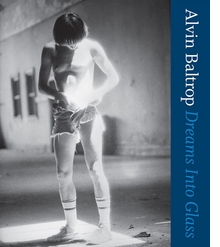 Alvin Baltrop: Dreams into Glass
Alvin Baltrop: Dreams into Glass
Published by Contemporary Arts Museum, Houston.
Edited and with text by Valerie Cassel Oliver. Introduction by Douglas Crimp. Forward by Bill Arning.
Dreams into Glass accompanies the first major museum exhibition of African-American photographer Alvin Baltrop (1948–2004), whose career unfolded in the late 1960s amid a period of turbulent social and political upheaval. Following a stint in the Navy, Baltrop returned to New York in the 1970s and immersed himself in the city’s decaying landscape, documenting a post-industrial wasteland of vacant manufacturing buildings that included the piers located along the Hudson River in lower Manhattan. It was here that Baltrop captured his most iconic images of nocturnal danger and despair alongside intimate and voyeuristic portraits of the homeless, teenage runaways, prostitutes and clandestine sexual encounters. During this period, Baltrop captured Gordon Matta-Clark’s monumental piece “Day’s End” and the work of graffiti artist, Tava, now lost to history. This survey features over three decades of vintage and reprinted photographs as well as archival material--from Baltrop’s intimate portraits of Navy friends and other enlisted men to his poetic body abstractions and street photography to the documentation of an era of gay sexual abandon between the Stonewall riots and the AIDS pandemic.
PUBLISHER
Contemporary Arts Museum, Houston
BOOK FORMAT
Paperback, 10 x 8.5 in. / 60 pgs / 10 color / 30 bw.
PUBLISHING STATUS
Pub Date 8/31/2012
Out of print
DISTRIBUTION
D.A.P. Exclusive
Catalog: FALL 2012 p. 90
PRODUCT DETAILS
ISBN 9781933619392 TRADE
List Price: $14.95 CAD $21.00 GBP £12.99
AVAILABILITY
Not available
STATUS: Out of print | 00/00/00 For assistance locating a copy, please see our list of recommended out of print specialists |
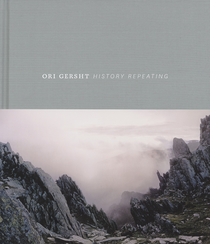 Ori Gersht: History Repeating
Ori Gersht: History Repeating
Published by MFA Publications, Museum of Fine Arts, Boston.
Text by Al Miner, Yoav Rinon. Interview by Ronni Baer.
History Repeating is the first comprehensive survey of the Israeli-born photographer and video artist Ori Gersht (born 1967). This richly illustrated book presents the best of Gersht’s achingly beautiful images, and explores how he intertwines spectacles of painterly and narrative imagery with personal and collective memory, metaphysical journeys, contextualized spaces and the history of art and photography. Be it in the scars left on the sunlit yet war-torn buildings in Sarajevo, the white noise of his train journey to Auschwitz, or the clearing of trees in a forest that once stood witness to mass murder in Ukraine, Gersht’s vision bridges a history that is full of violent horror and a world of emergent, transcendent beauty. From the radiant optical glow of pollution in the atmosphere to his freeze-frame shots of shattering floral arrangements frozen by liquid nitrogen, Gersht’s calm is one that comes after the storm. In his 2010 series of Japanese landscapes, the ghostly visual static of cherry-blossom petals echo the militarism and sacrificed youth of World War II and the more recent nuclear fallout of Fukushima, but in their own extreme transience, they also manage to embody the possibility of spiritual renewal. History Repeating demonstrates the thin line between beauty and brutality and the sublime draftsmanship behind history’s various traumatic scars. History repeats itself: first as tragedy, then as unexpected beauty.
PUBLISHER
MFA Publications, Museum of Fine Arts, Boston
BOOK FORMAT
Clth, 9.75 x 11.75 in. / 256 pgs / 130 color.
PUBLISHING STATUS
Pub Date 9/30/2012
Out of print
DISTRIBUTION
D.A.P. Exclusive
Catalog: FALL 2012 p. 82
PRODUCT DETAILS
ISBN 9780878467792 TRADE
List Price: $60.00 CAD $79.00 GBP £53.00
AVAILABILITY
Not available
STATUS: Out of print | 00/00/00 For assistance locating a copy, please see our list of recommended out of print specialists |
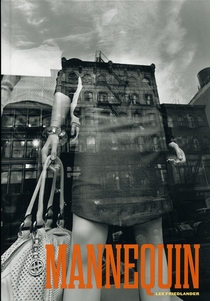 Lee Friedlander: Mannequin
Lee Friedlander: Mannequin
Published by Fraenkel Gallery.
Lee Friedlander is one of the few artists in any medium to have sustained a body of influential work over five decades. To make the photographs in Mannequin, he returned to the hand-held, 35-mm camera that he used in the earliest decades of his career. Over the past three years, Friedlander has roamed the sidewalks of New York City, Los Angeles and San Francisco, focusing on storefront windows and reflections that conjure marketplace notions of sex, fashion and consumerism, while recalling Atget’s surreal photographs of Parisian windows made 100 years earlier. Thoroughly straightforward, their unsettling and radical new compositions suggest photographs that have been torn up and pasted back together again in near-random ways.
Lee Friedlander (born 1934) first came to public attention in the landmark exhibition New Documents, at The Museum of Modern Art, New York, in 1967. The range of his work since then—including portraits, nudes, still lifes and studies of people at work—is anchored in a uniquely vivid and far-reaching vision of the american scene. More than 40 books about his work have been published since the early 1970s, including Self-Portrait, Sticks and Stones, Cherry Blossom Time in Japan, Family, America by Car, People at Work and The New Cars 1964. His career was the focus of a major traveling retrospective organized by The Museum of Modern Art in 2005. His work can be found in depth in the collections of The Museum of Modern Art, the Metropolitan Museum of Art, the San Francisco Museum of Art and the National Gallery of Art, among many others.
PUBLISHER
Fraenkel Gallery
BOOK FORMAT
Hardcover, 9 x 13 in. / 112 pgs / 103 duotone.
PUBLISHING STATUS
Pub Date 7/31/2012
Active
DISTRIBUTION
D.A.P. Exclusive
Catalog: FALL 2012 p. 22
PRODUCT DETAILS
ISBN 9781881337324 TRADE
List Price: $49.95 CAD $67.50 GBP £44.99
AVAILABILITY
Out of stock
STATUS: Out of stock Temporarily out of stock pending additional inventory. |
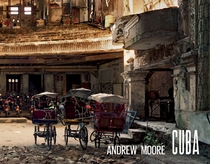 Andrew Moore: Cuba
Andrew Moore: Cuba
Published by Damiani.
Introduction by Joel Smith. Text by Orlando Luis Pardo Lazo.
American photographer Andrew Moore began photographing in Cuba in 1998, and over the next fourteen years he made ten further visits, working to reveal the many facets of the island’s unique character and life. In 2002, he published some of this work in Inside Havana, which is now out of print. This new edition includes many of Moore’s older classic images but reconceives its predecessor with a new layout and finer, larger reproductions. Cuba also features many older photographs never previously published, as well as new photographs made specifically for this edition. The afterword was especially commissioned for this edition from Orlando Luis Pardo Lazo, one of Cuba’s leading independent bloggers.
Working with a large format camera, Moore insightfully records the shifting fortunes of Cuba, in superb photographs full of painterly light and dynamic color. His images span a tremendous variety of subjects, ranging from humble interiors to magnificent modernism, as well as portraits and landscapes. One theme introduced in this revised version is the contrast between the frayed patinas of Cuban homes and the great, unspoiled beauty of the island’s nature. Cuba is a stirring portrait of a country isolated from the globalized world, overflowing with its own remarkable riches.
The photographs of Andrew Moore (born 1957) are represented in the collections of the Metropolitan Museum of Art, the Whitney Museum, Yale University Art Gallery, The Museum of Fine Arts Houston, the Library of Congress, the Israel Museum, the George Eastman House and the Canadian Centre for Architecture.
PUBLISHER
Damiani
BOOK FORMAT
Hardcover, 15.75 x 11.75 in. / 128 pgs / 68 color.
PUBLISHING STATUS
Pub Date 9/30/2012
Out of print
DISTRIBUTION
D.A.P. Exclusive
Catalog: FALL 2012 p. 10
PRODUCT DETAILS
ISBN 9788862082525 TRADE
List Price: $75.00 CAD $99.00
AVAILABILITY
Not available
STATUS: Out of print | 00/00/00 For assistance locating a copy, please see our list of recommended out of print specialists |
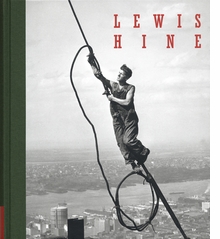 Lewis Hine
Lewis Hine
Published by D.A.P./Distributed Art Publishers.
Text by Alison Nordström, Elizabeth McCausland.
In 1905, a young sociologist named Lewis Hine Wickes decided to pursue photography as the medium with which to denounce injustice and poverty. Hine was one of the first photographers to document the wave of mass immigration from an impoverished Europe to an economically booming America, and his portraits of immigrants at Ellis Island offered a more positive image of this influx. Later, while working with the National Child Labor Committee, Hine compiled a vast corpus of images that showed how American industry was making use of child labor, helping to bring about changes in U.S. child labor law. But as he wearied of photographing poverty, Hine developed an idealized vision of the worker that emphasized the dignity of labor--a vision that culminated in his legendary Men at Work series, first published in 1932 and today a classic American photobook. "We call this the Machine Age," he wrote in its introduction, "But the more machines we use, the more do we need real men to make and direct them." This beautifully produced volume, which includes a complete facsimile of Men at Work, is compiled from the collection of the George Eastman House, to whom Hine's son bequeathed his archive after his death. It includes both well-known series and recently discovered early works, plus rare family photographs, ephemera and a detailed chronology. The works are arranged in thematic groupings: "Ellis Island," "Tenements," "Child Labor," "Chicago and New York," "Pittsburgh," "Europe," "Black America," "Empire State Building" and "New Deal."
Lewis Hine (1874-1940) was born in Wisconsin and studied sociology at the University of Chicago. He served as official photographer for the WPA and for the construction of the Empire State Building. His later years were filled with professional struggles due to loss of patronage.
PUBLISHER
D.A.P./Distributed Art Publishers
BOOK FORMAT
Clth, 8.75 x 10 in. / 264 pgs / 230 duotone.
PUBLISHING STATUS
Pub Date 1/15/2012
Out of print
DISTRIBUTION
D.A.P. Exclusive
Catalog: SPRING 2012 p. 85
PRODUCT DETAILS
ISBN 9781935202769 TRADE
List Price: $65.00 CAD $75.00
AVAILABILITY
Not available
STATUS: Out of print | 00/00/00 For assistance locating a copy, please see our list of recommended out of print specialists |
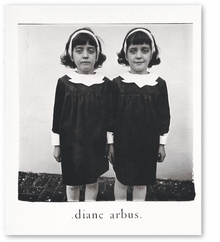 Diane Arbus: An Aperture Monograph
Diane Arbus: An Aperture Monograph
Fortieth-Anniversary Edition
Published by Aperture.
Edited by Marvin Israel, Doon Arbus.
When Diane Arbus died in 1971 at the age of 48, she was already a significant influence--even something of a legend--for serious photographers, although only a relatively small number of her most important pictures were widely known at the time. The publication of Diane Arbus: An Aperture Monograph in 1972--along with the posthumous retrospective at The Museum of Modern Art--offered the general public its first encounter with the breadth and power of her achievements. The response was unprecedented. The monograph, composed of 80 photographs, was edited and designed by the painter Marvin Israel, Diane Arbus’ friend and colleague, and by her daughter Doon Arbus. Their goal in producing the book was to remain as faithful as possible to the standards by which Arbus judged her own work and to the ways in which she hoped it would be seen. Universally acknowledged as a photobook classic, Diane Arbus: An Aperture Monograph is a timeless masterpiece with editions in five languages, and remains the foundation of her international reputation. A quarter of a century has done nothing to diminish the riveting impact of these pictures or the controversy they inspire. Arbus’ photographs penetrate the psyche with all the force of a personal encounter and, in doing so, transform the way we see the world and the people in it.
PUBLISHER
Aperture
BOOK FORMAT
Paperback, 9.25 x 11 in. / 182 pgs / 82 duotone.
PUBLISHING STATUS
Pub Date 9/30/2012
No longer our product
DISTRIBUTION
Contact Publisher
Catalog:
PRODUCT DETAILS
ISBN 9781597111751 TRADE
List Price: $39.95 CAD $50.00
AVAILABILITY
Not Available
the source for books on art & culture
CUSTOMER SERVICE
orders@artbook.com
212 627 1999 ext 202
M-F 10-6 EST
Ingram Customer Care
800-937-8200 option 3
orders@dapinc.com
NEW YORK
Showroom by Appointment Only
75 Broad Street, Suite 630
New York NY 10004
Tel 212 627 1999
LOS ANGELES
Showroom by Appointment Only
818 S. Broadway, Suite 700
Los Angeles, CA 90014
Tel. 323 969 8985
ARTBOOK LLC
D.A.P. | Distributed Art Publishers, Inc.
All site content Copyright C 2000-2023 by Distributed Art Publishers, Inc. and the respective publishers, authors, artists. For reproduction permissions, contact the copyright holders.
The D.A.P. Catalog
www.artbook.com

